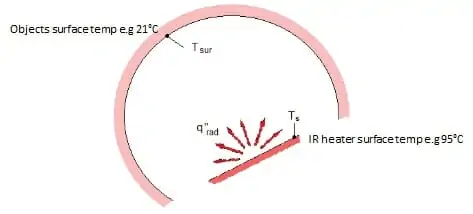No products in the cart.
Key differences: Radiant Vs convection heat
Radiant heat warms objects and surfaces without heating the air in between. Those objects warm up directly and radiate back.
Convection warms the air, which is a triple inefficiency. The air has to:
- Warm up. Air absorbs heat poorly;
- Travel (unforced convection of heat is always upwards to the ceiling or through doors and windows. Only forced convection – using a fan – convects heat horizontally );
- Deliver the heat to something. Air transfers heat out poorly;
Degree for degree °F, radiant heat delivers the heat transfer capability of convection to the power of 4 (Boltzmann’s law).
CONVECTION

- Heat exchange has to occur twice (indirect heating of objects)
- Air absorbs & retains heat poorly
- Hot air rises and is prone to infiltration loss (draughts)
- Air heats thermal mass poorly, so when the heating stops, so does the warmth.
RADIANCE

- Heat exchange occurs once (direct heating of objects)
- Most domestic materials absorb & retain heat well
- Less prone to infiltration loss in an enclosed space
- Excellent priming of thermal mass = when heating stops, residual heat is left in the building.
Advantages for heaters
The advantages of radiant heating over convection:
- Heat transferred (watts / foot / second) grows exponentially with temperature rise. Convection heat transfer grows only linearly with temperature.
- You require less installed capacity in a radiant heating system
- You don’t need to run it as long
- You can apply heat only where you need it – you don’t need to heat the whole room
- You can control it more precisely
Types of radiant heaters from Herschel
Herschel Infrared Heaters
Infrared Panel Heaters– these are mostly used in residential and office applications.
Hot Yoga / Bikram Infrared Heaters – for reaching temepratures up to 113°F
Infrared Space Heaters – for heating larger enclosed or sheltered outdoor spaces
Outdoor Infrared Patio Heaters – for heating unsheltered areas (e.g. patios) or colder indoor areas.

